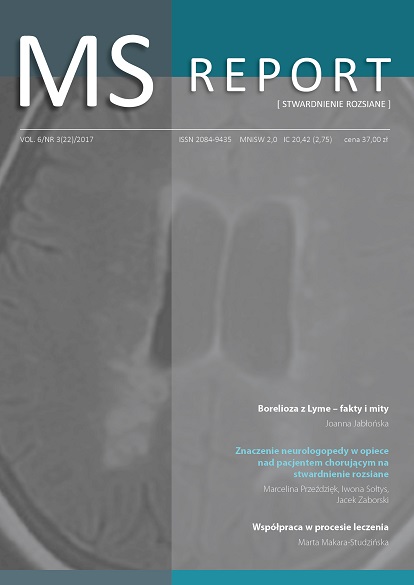Znaczenie neurologopedy w opiece nad pacjentem chorującym na stwardnienie rozsiane Artykuł przeglądowy
##plugins.themes.bootstrap3.article.main##
Abstrakt
W obrazie klinicznym stwardnienia rozsianego istotne miejsce zajmują dyzartryczne zaburzenia mowy. Na podstawie najnowszych danych szacuje się, że 23–51% chorujących doświadcza w czasie choroby trudności z mową, które są przyczyną kłopotów z komunikacją z otoczeniem. Ponadto w zależności od stopnia nasilenia objawów i stanu pacjentów zaburzenia połykania dotyczą nawet 33–67% z nich. W artykule przedstawiono i omówiono rolę terapii logopedycznej w procesie rehabilitacji pacjentów ze stwardnieniem rozsianym. Wskazano możliwości diagnostyczno-terapeutyczne.
##plugins.themes.bootstrap3.article.details##
Numer
Dział
Artykuły
Copyright © by Medical Education. All rights reserved.
Bibliografia
1. Hinrichs J., Finlayson M.: An overview of Multiple Sclerosis Rehabilitation. W: Finlayson M. (red.): Multiple Sclerosis Rehabilitation: From Impairment to Participation. CRC Press, 2012: 43-68.
2. Miller-Sorensen P.: Dysarthria. W: Burks J.S., Johnson K.P. (red.): Multiple Sclerosis. Diagnosis, medical management and rehabilitation. Wyd. Demos, New York 2000: rozdz. 21.
3. Jauer-Niworowska O.: Dyzartria nabyta. Diagnoza logopedyczna i terapia osób dorosłych. Wyd. APS, Warszawa 2009.
4. Tarkowski Z., Lewandowski Z. (red.): Dyzartria. Teoria i praktyka. Wyd. Fundacja Orator, Lublin 1999.
5. Freed D.B.: Motor speech disorders. Diagnosis and treatment. Second Edition. Delmar Cengage Learning USA, 2011: rozdz. 3.
6. Halama A.R.: Kliniczne podejście otolaryngologa do chorego z dysfagią. Otolaryngologia Polska 1995; XLIX(19): 29-36.
7. Litwin M.: Logopedyczna terapia zaburzeń połykania w chorobach neurologicznych. Logopeda 2009; 1(7): 126-138.
8. De Pauw A., Dejaeger E., D’hooghe B., Carton H.: Dysphagia in multiple sclerosis. Clinical Neurology and Neurosurgery 2002; 4(104): 345-351.
9. Czernuszenko A.: Jak rozpoznać zaburzenia połykania u osób ze stwardnieniem rozsianym? MS Report 2017; 1: 11-20.
10. Olszewski J., Zielińska-Bliźniewska H., Pietkiewicz P.: Zaburzenia połykania jako interdyscyplinarny problem diagnostyczny i leczniczy. Polski Przegląd Otolaryngologiczny 2011; 0(0): 44-49.
11. Denk-Linnert D.M.: Evaluations of symptoms. W: Ekberg O. (red.): Dysphagia: diagnosis and treatment. Berlin 2012.
12. Przeździęk M.: Usprawnianie mowy w SM. Zestaw ćwiczeń logopedycznych dla osób chorych na stwardnienie rozsiane. Oddział Warszawski PTSR, 2011.
2. Miller-Sorensen P.: Dysarthria. W: Burks J.S., Johnson K.P. (red.): Multiple Sclerosis. Diagnosis, medical management and rehabilitation. Wyd. Demos, New York 2000: rozdz. 21.
3. Jauer-Niworowska O.: Dyzartria nabyta. Diagnoza logopedyczna i terapia osób dorosłych. Wyd. APS, Warszawa 2009.
4. Tarkowski Z., Lewandowski Z. (red.): Dyzartria. Teoria i praktyka. Wyd. Fundacja Orator, Lublin 1999.
5. Freed D.B.: Motor speech disorders. Diagnosis and treatment. Second Edition. Delmar Cengage Learning USA, 2011: rozdz. 3.
6. Halama A.R.: Kliniczne podejście otolaryngologa do chorego z dysfagią. Otolaryngologia Polska 1995; XLIX(19): 29-36.
7. Litwin M.: Logopedyczna terapia zaburzeń połykania w chorobach neurologicznych. Logopeda 2009; 1(7): 126-138.
8. De Pauw A., Dejaeger E., D’hooghe B., Carton H.: Dysphagia in multiple sclerosis. Clinical Neurology and Neurosurgery 2002; 4(104): 345-351.
9. Czernuszenko A.: Jak rozpoznać zaburzenia połykania u osób ze stwardnieniem rozsianym? MS Report 2017; 1: 11-20.
10. Olszewski J., Zielińska-Bliźniewska H., Pietkiewicz P.: Zaburzenia połykania jako interdyscyplinarny problem diagnostyczny i leczniczy. Polski Przegląd Otolaryngologiczny 2011; 0(0): 44-49.
11. Denk-Linnert D.M.: Evaluations of symptoms. W: Ekberg O. (red.): Dysphagia: diagnosis and treatment. Berlin 2012.
12. Przeździęk M.: Usprawnianie mowy w SM. Zestaw ćwiczeń logopedycznych dla osób chorych na stwardnienie rozsiane. Oddział Warszawski PTSR, 2011.

